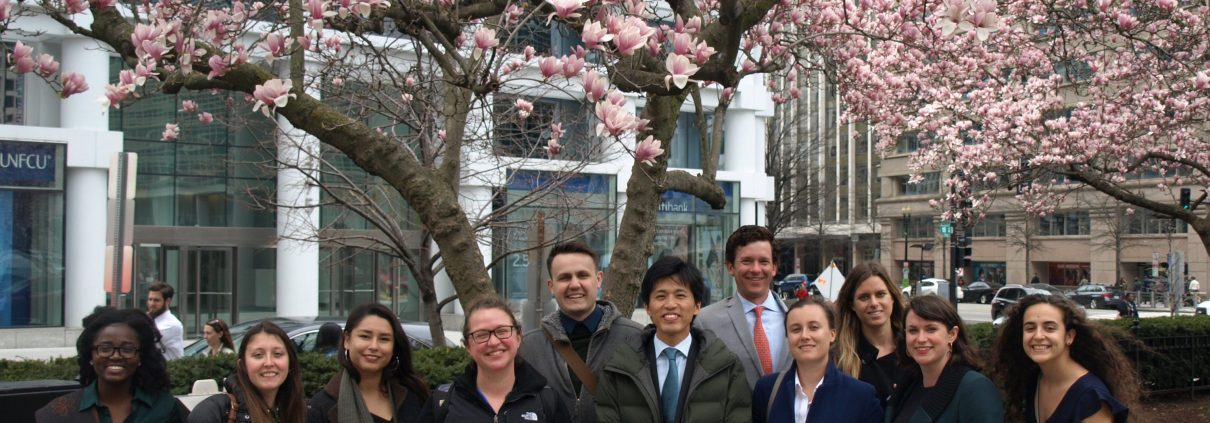Global Public Affairs in D.C.
by Landy Joseph, MURP ’20 and Madeleine Sims, MURP ’20
The trip to DC was full of lessons and inspiration that will continue to serve as fuel for us to push forward in the pursuit of our passions for entering the field of global work. At the end of a four-day jam-packed itinerary, a once murky industry appeared more organized and full of opportunities through which students can work, research, and attain successful career paths in serving others.
Our journey began with a meeting, with Jacob Veverka from USAID, at the Ronald Reagan building, who described his career path and USAID’s operations. Jacob was able to weave together stories from the field with lessons for us as we think about our future career development, everything from skills to handling personal life in an industry known for heavy travel demands. Setting the stage with a talk about USAID was key to our successes later on in the trip and understanding how the industry is organized, from governments, multilateral corporations and small NGOs to funding sources and ownerships. The industry is highly organized. We were able to sit down with research institutes such as the World Resource Institute to learn about the research process and active projects on electric vehicles. We also sat with firms who complete evaluations such as the MCC and Mathematica who outlined how these two components fit into the international development field. At Mathematica with Nickie Fung and her colleagues, we learned about what happens after a project is completed, both these firms instilled in us a learning component not only for personal improvement but to better the programs many of us expressed interest in implementing. Hearing from Luskin alumni in the industry was powerful, not only are there just alumni in DC, they were incredibly open to not only discussing their career paths but job skills and how to navigate the industry, insider knowledge we were all eager to have.
Our hosts were open and honest on sharing past working experiences, the different turns their careers have taken and gave advice on how to package those experiences and present them to new potential opportunities in order to continue moving forward. Our first key takeaway was to not shut down an opportunity just because it is not exactly what we want to be doing. If there are some opportunities to learn a new skill we should give an offer considerable consideration because it presents an opening into the field and an opportunity to build our reputation, which is crucial for growth and potential collaboration in the future. The second pertains to tangible skills we should focus on improving while we are in school, such as reading and synthesizing information quickly and concisely, improving quantitative and qualitative research skills and learning how to analyze policy. We were advised to also continue practicing good interpersonal skills and to be intentional with making professional relationships. We heard from more than a few of the organizations that a huge part of what will allow us to be successful will be because of the professional relationships we build. Lastly, we heard from many of the hosts that we should learn to perfect our “elevator speeches”. We got to hear how multifaceted international work can be, see how so many different skills can come together in the spaces we might potentially work.
One of the most profound visits was with Blair Glencourse at Accountability Labs located in the OpenGov Hub. Blair described a project about changing the narrative on corruption and drawing attention to those with integrity working in government across the world. Landy has interests in work to rebuild communities after natural disasters in ways that equip those communities with skills and resources to support themselves in the future, while Madeleine has interests are at the intersection of disaster risk reduction and climate change adaptations. Blair’s presentation was a thread through both of our fields. We walked away from this trip with increased understanding of how we will fit into this field, not only from a hard skills perspective, but where this work is being done and the intersections of research, implementation, and evaluation. Though industry organization and job tips were abounding, the keys to a successful future in this industry are: networking, flexibility and teamwork. Those we met exuded all of these qualities. Most importantly, we were inspired by the dedication of all the firms we visited to results on the ground, from researchers, implementers, and evaluators, all stakeholders were dedicated to positive results and improving the development process. This trip allowed us to analyze how we might best serve others with the skills we have now, and what to develop as we continue with our studies at Luskin.




